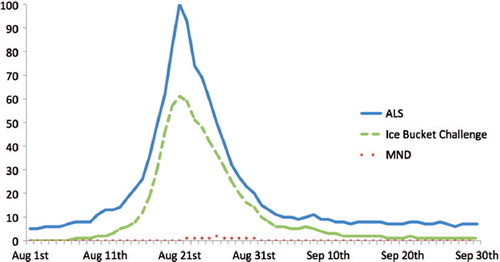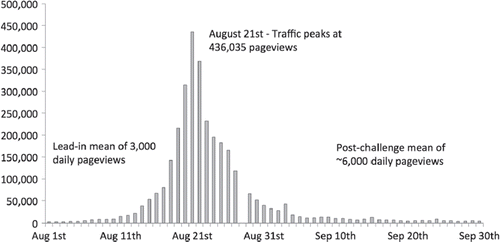The “ice bucket challenge” started as a joke between friends unrelated to amyotrophic lateral sclerosis (ALS) where participants shared videos dumping a bucket of ice water over their heads and challenging their friends to do the same. In August 2014, the viral challenge reached ALS patient and former Boston College baseball captain Pete Frates. Once Frates’ network began taking on the challenge, it evolved to include a donation to ALS research.
A feel-good story featuring patients, pop-stars, and presidents was promoted with gusto, with positive consequences for both funding and awareness (“Take the plunge (for charity).,” Citation2014). Every ALS charity reported major increases in donations during a 30-day period this summer (see ), over 6 million videos were shared on YouTube, and the videos of celebrities such as Bill Gates received over 20 million views (https://www.youtube.com/watch?v = XS6ysDFTbLU). In terms of awareness the Wikipedia page on ALS went from around 3,000 daily views to a surge of traffic peaking on August 21st with over 450,000 views in a single day, though it has since returned to normal ().
Figure 1. Increased volume of Google search traffic for the search terms ‘ALS’, ‘Ice Bucket Challenge’, and ‘MND’. Values are relative, scaled 0–100 from the highest volume of search terms; ‘ALS’ was entered as a search term around 100 times more than ‘MND’. Data source: https://www.google.com/trends/explore#q = ALS%2C%20MND%2C%20Ice%20bucket%20 challenge&date = today%203-m&cmpt = q.

Table I. Additional funding reported by the major ALS charities as a result of the Ice Bucket Challenge. Adapted from https://en.wikipedia.org/wiki/Ice_Bucket_Challenge.
The inevitable backlash accused participants of “slacktivism”, decrying that most participants said little about ALS, were having fun rather than donating, were failing to take notice of more important issues, or (more cynically) were participating in a “self-congratulatory” “middle class wet t-shirt competition” while parts of the Western US were in drought. Fortunately for us, many of these critics then made a point of detailing what ALS actually is, thereby filling the gap and raising awareness still further. Those who object to animal testing or stem cell research raised moral and religious objections, while poignant videos from Gaza showed civilians dumping the remnants of their bombed homes over their heads wishing they got the same level of attention; similarly, charities in India called for a “rice bucket challenge”. As temperatures in the US dropped in September, the fad appeared to have run its course.
Where does this leave all of those who participated and all of those who might benefit? While the scientific community already has thoughts in terms of allocating the windfall (CitationVaidya, 2014), the field might also learn from funders like the Patient- Centered Outcomes Research Institute (PCORI) which closely involves patients as grant reviewers and engages them throughout the research process in a way that is without parallel in ALS today (Fleurence et al., Citation2013; Selby, Beal, & Frank, Citation2012). The challenge also highlighted confusion due to naming conventions for ALS/MND/Lou Gehrig's disease/Anterior horn cell disease/Charcot's disease. For example, analysis of Google Trends shows that while “ALS” experienced a major spike in online search activity all around the world, “MND” (or motor neuron disease) had much lower levels of engagement (). Although rebranding can be costly and felt to be a distraction to some, in the long term maintaining all these names seems unsustainable. Perhaps now would be a sensible time to begin laying plans to consolidate the name globally as ALS.
Figure 2. Dramatic but transient increase in Wikipedia traffic to the ALS page in the summer of 2014. Data source: http://stats.grok.se/en/latest90/Amyotrophic_lateral_sclerosis#, missing data on August 28th.

In reaction to this spontaneous grass-roots activism, Wikipedia was a key educational tool. Despite this, the patient organizations and ALS research groups have no systematic efforts underway to ensure that the page is up to date and accurate, and have so far rejected calls to get involved citing the burden involved. By contrast, Parkinson's UK has undertaken training courses with the WikiMedia foundation and has helped develop and maintain the page on Parkinson's disease. By meeting information seekers where they are we might better educate the public about the disease.
Fads shine brightly but burn out quickly. Perhaps we might learn from other movements such as “Movember” which has graduated from a spontaneous one-off fad to an annual event which benefits prostate cancer but retains its anarchic spirit. We must find clever and engaging ways to reflect what we've done with the money back to those who took part, who might otherwise never think about ALS again. Can we too elevate this fad to the first in a series of events that bring raising awareness and funds for this condition to a whole new level? If so, August of 2015 is ours to lose in terms of momentum. Let's use this splash of cold water to emerge refreshed, revitalized, and ready to re-engage our foe.
Disclosures: The author nominated Jeremy Hunt for the challenge, who has yet to take him up on his offer. PW is an employee of PatientsLikeMe, whose co-founders also founded ALSTDI, which has benefitted from the Ice Bucket Challenge. PW's PhD studentship was funded by the Motor Neurone Disease Association, which has benefitted from the Ice Bucket Challenge. The author alone is responsible for the content and writing of the paper.
Declaration of interest: The author reports no conflicts of interest. The author alone is responsible for the content and writing of the paper.
References
- Fleurence, R., Selby, J. V., Odom-Walker, K., Hunt, G., Meltzer, D., Slutsky, J. R., et al.How the Patient-Centered Outcomes Research Institute is engaging patients and others in shaping its research agenda. Health Affairs (Project Hope), 2013; 32, 393–400. doi:10.1377/hlthaff.2012.1176
- Selby, J. V., Beal, A. C., Frank, L.The Patient-Centered Outcomes Research Institute (PCORI) national priorities for research and initial research agenda. Jama, 2012;307, 1583–1584. doi:10.1001/jama.2012.500.
- Take the plunge (for charity). Take the plunge (for charity). Nature Medicine, 2014;20, 1079–1079. doi:10.1038/nm.3723
- Vaidya, M. (2014). Ice bucket challenge cash may help derisk ALS drug research. Nature Medicine, 2014;20, 1080–1080. doi:10.1038/nm1014-1080.
